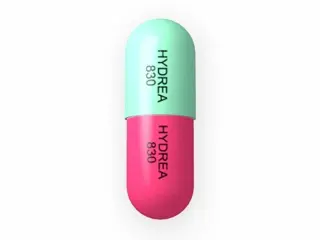Buy Hydroxyurea Online in New Zealand — No Prescription Needed
| Package | Dosage | Price | Price per Dose | |
|---|---|---|---|---|
| Dosage: 500mg | ||||
| 240 pill | 500mg | NZD1,418.23 | NZD5.93 | |
| 120 pill | 500mg | NZD747.00 | NZD6.23 | |
| 90 pill | 500mg | NZD592.72 | NZD6.58 | |
| 60 pill | 500mg | NZD424.91 | NZD7.06 | |
| 30 pill | 500mg | NZD246.27 | NZD8.20 | |

Hydroxyurea Description
Overview of Hydroxyurea
Hydroxyurea is a medication widely used to treat various medical conditions, primarily certain types of blood disorders. It belongs to a class of drugs known as antineoplastic agents and works by interfering with the growth and proliferation of abnormal cells. This medication is known for its effectiveness in managing sickle cell disease, a genetic disorder that causes abnormally shaped red blood cells. Additionally, it is used for treating specific types of leukemia and other hematologic conditions.
Mechanism of Action
Hydroxyurea functions by inhibiting ribonucleotide reductase, an enzyme crucial for DNA synthesis. By disrupting DNA production, the drug reduces the proliferation of fast-growing cells, including abnormal blood cells typical in sickle cell disease and certain cancers. This mechanism helps decrease the frequency of painful crises in sickle cell patients and controls the expansion of malignant cells in leukemia. Its targeted action makes it a valuable component of many therapeutic regimens for blood-related disorders.
Uses and Benefits
One of the primary uses of Hydroxyurea is in the treatment of sickle cell anemia. It has been shown to increase the production of fetal hemoglobin, which can help reduce the sickling of red blood cells. This leads to fewer vaso-occlusive episodes and less pain for patients. For patients with specific leukemias, Hydroxyurea helps control the progression by reducing abnormal cell proliferation. The medication can also decrease the need for blood transfusions in some cases.
The benefits of Hydroxyurea include improved quality of life for sickle cell patients and better disease management for certain cancers. Its oral administration offers a convenient option compared to more invasive treatments. Many patients experience a significant reduction in complications associated with their conditions, which enhances their overall well-being.
Potential Side Effects
As with many medications, Hydroxyurea may cause side effects. Common adverse effects include nausea, vomiting, and loss of appetite. Some patients may experience hair loss, which is usually reversible upon discontinuation of the drug. Less frequent but more severe side effects include suppression of bone marrow activity leading to low blood counts, which can result in increased risk of infections, anemia, or bleeding issues. Regular blood testing is essential to monitor for hematologic toxicity.
Other possible concerns involve skin reactions, such as rashes or ulcers, and gastrointestinal discomfort. Long-term use has been associated with a potential increased risk of secondary malignancies, so careful consideration and monitoring are necessary during treatment. Patients should always discuss potential risks and benefits with their healthcare provider before starting Hydroxyurea therapy.
Usage and Precautions
Hydroxyurea is typically prescribed at a dose tailored to the patient's condition and response. It is important for patients to follow their healthcare provider's instructions closely, including dosing schedules and monitoring requirements. Regular blood tests are crucial for detecting early signs of toxicity and adjusting the dose accordingly.
Patients should inform their doctors about any other medications they are taking to avoid harmful interactions. Pregnant or breastfeeding women should discuss potential risks, as Hydroxyurea may have teratogenic effects. Proper hand hygiene and skin care are advised to minimize skin-related side effects. Patients with pre-existing conditions, such as immunosuppression or liver problems, should ensure their healthcare provider is aware of their health status before starting treatment.
Overall, Hydroxyurea remains an essential medication in the management of specific hematological conditions. Its effective reduction of disease symptoms and complication rates makes it a valuable therapy, provided it is used under proper medical supervision. Patients should always adhere to their prescribed regimen and report any adverse effects promptly to ensure safe and effective treatment outcomes.
